Here is an urgent plea from network operators, academic researchers and activists: we must decrease energy consumption and materials usage in Internet operations, governance, and standardisation. This is our only hope if we're to adapt to the current climate crisis and prevent catastrophic consequences.
The IAB (Internet Architecture Board) hosted a workshop on Environmental Impacts of the Internet Applications and Systems in December 2022:
...to discuss the Internet’s environmental impact, discuss the evolving needs from industry, and to identify areas for improvements and future work.
The Internet runs on systems that require energy and raw materials to manufacture and operate. While the environmental benefits of the Internet may certainly outweigh this use of resources in many cases, it is incumbent on the Internet industry to ensure that this use of resources is minimized and optimized.
This fits well within one of the IAB's major roles in long term planning and coordination between different areas of IETF activity.
Over the course of two weeks, in four multi-hour sessions, ~50 participants shared presentations, discussions and pointers to interesting documents — and came up with a better understanding of the complexity of problems, as well as some concrete action points for the near future.
You can find all the video recordings and slides here:
- Session 1 - The Big Picture (slides)
- Session 2 - What Do We Know? (slides)
- Session 3 - Improvements (slides)
- Session 4 - Next Steps (slides)

I took part both in my capacity as a Community Builder for the RIPE NCC, and with my personal inclinations to activism and “dreaming big”. My initial paper was urging IAB to be more ambitious than only decreasing environmental impact, but to also consider how can Internet contribute to “Climate Justice”.
I was invited to give a talk as part of the Big Picture presentations, focusing on Societal Aspects. After reading almost all the papers, I took inspiration from works by Fieke, Maya, and Shayna. I incorporated suggestions from Jukka and Wim. And I added my own "big dreams". This resulted in suggestions that were well received by workshop chairs and quoted in the follow-up sessions:
- 10% yearly decrease of energy & materials consumption for ICT;
- Focus on actions - not on measurements;
- Support for adding "Sustainability Considerations" section to each RFC!
Inspiration
- Fieke Jansen and Maya Richman - Environment, internet infrastructure, and digital rights
- Shayna Robinson, Remy Hellstern, Mariana Diaz - Sea Change: Prioritizing the Environment in Internet Architecture
- Jukka Manner - Sustainability Considerations
- Wim Vanderbauwhede - Frugal Computing
- Vesna Manojlovic - Internet Infrastructure and Climate Justice
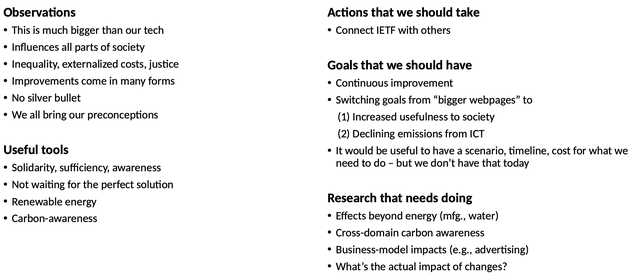
(Dis)Agreements
With 30 papers and 40 presentations and 50 knowledgable and opinionated people, there was much information to be processed, many discussions and quite a few disagreements.
I have strong objections to the conclusion by Jens Malmodin that the "Internet consumes less energy and emits less carbon than what many think".
This might be because there was no clarity, even between the participants, of what should be considered "the Internet": core? edge? whole ICT?
I also disagree with a focus of this paper on "increasing energy efficiency" , because I believe that the focus should be on decreasing the consumption. While I do find encouraging the existence of a group of technology vendors, service and content providers would be interested in "Greening of Streaming", I find their focus on increasing energy efficiency is misguided, because of "efficacy myth" and Jevons paradox.
Luckily, there were many more papers that I did agree with and learned from:
- Eve M. Schooler, et.al. -A Perspective on Carbon-aware Networking (slides)
- Romain Jacob - Towards a power-proportional Internet
- Jari Arkko, Nina Lövehagen, Pernilla Bergmark - Environmental Impacts of the Internet: Scope, Improvements, and Challenges
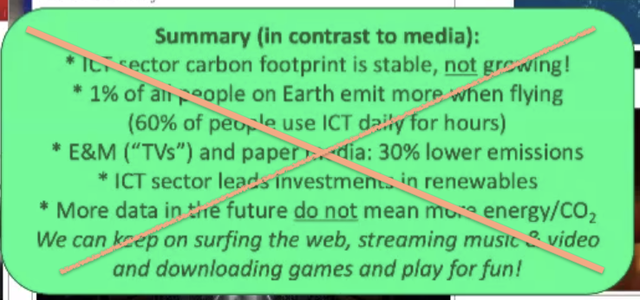
Preliminary Conclusions
At the end of the Session 4 - on Next Steps (slides) - there were some high-level conclusions, and I will select just a few:
- The workshop clearly believes that there’s a need for Internet technology to both:
- Help other areas of society in reducing the overall environmental impacts, and
- Do everything we can to help reduce Internet’s own environmental impact
- There’s momentum in this topic, and this can be used to make improvements
- Design for energy constrained situations, and your designs may work also elsewhere
Personal Recommendations
After listening to many detailed technological discussions, I still think that we should focus on how to degrowth the Internet, so that it fits within planetary limits (keeping the energy usage and CO2 emissions below the "Paris Agreement targets" for 1.5 degrees warming), and reversing the overconsumption of materials, water and energy.
For me, the main take-aways from the workshop were:
- Urgency of action
- Due to the accelerating damages done to the planet & future generations - if we continue with "business as usual"
- Who was not present - and how to include them?!
- To start with: End Users (see RFC8890)
- Those who have less power, due to the centralisation & consolidation forces (see draft)
- Solidarity with those who are the most e-impacted: exploited, oppressed and marginalised (through the intersectional feminist lens)
My personal suggestion is: to challenge existing power structures, through political demands and activism. I will elaborate on these in my follow-up articles and presentations.

Next Steps
Here are some small but concrete steps for workshop participants (and Dear Readers) to do:
- Discussion on the "e-impact" list should continue!
- Discussion at the IETF-116 IABOPEN session
- Improvements will progress independently: metrics, implementations, TVR, etc.
- Maybe something else as well?
- “Sustainability considerations & tradeoffs” document
- A new working group ”e-interest group”?
- (your idea here)
As a Community Builder for RIPE (NCC) community, I am inviting you to bring up these topics in Working Groups: mailing lists & forum:
- Connect-WG (for operational improvements)
- MAT-WG (Measurements, Analysis & Tools)
- Cooperation-WG: for "politically" cited topics
- Best Current (operational) Practices Task Force
- ... because, despite my idealism, business decision makers have to be influenced using their language, and there are already improvements that could be embraced by the ISPs and other network operators.
And if you don't like mailing lists, we also have a Discourse-based discussion forum:
forum.ripe.net
Events and Communities
One of the proposed actions & next steps was: for IETF to connect with others working on these topics.This resonates with my suggestion of "solidarity" -- focusing on those who are not usually present in
Here are some communities: activist, hackers and academics: to engage with in the next few months:
- Hacking in Parallel, December 27-30 2022, Berlin https://hip-berlin.de/
- FOSDEM (4-5.2.2023, Brussels) https://fosdem.org/2023/schedule/track/energy/
- MozFest: 20-24. March: https://www.mozillafestival.org/
- SEE-11, Split (Croatia), 4-5 April 2023 https://ripe.net/see
- RIPE86 , 22-26. May 2023, Rotterdam ripe86.ripe.net
- RightsCon, 5-8 June, Costa Rica https://www.rightscon.org/
- CCC Camp: 15-19. August, near Berlin https://www.ccc.de/en/updates/2022/no-congress-2022
- DeGrowth Conference, 29.8. Zagreb http://odrast.hr/
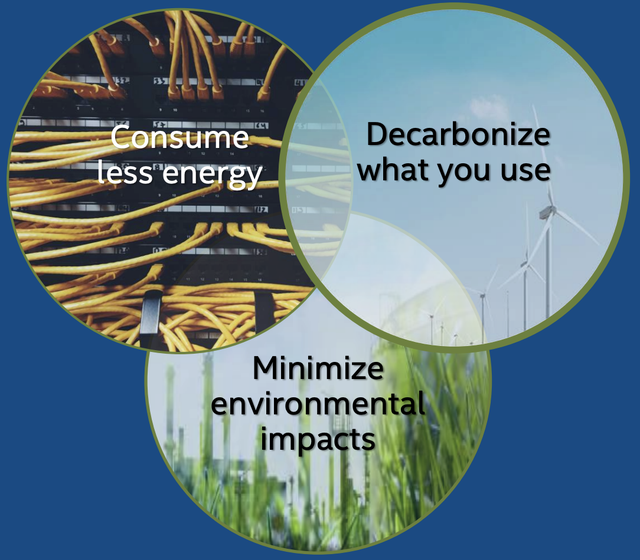


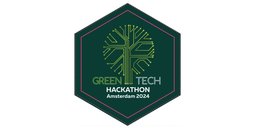
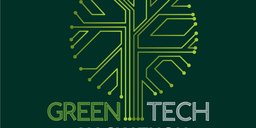
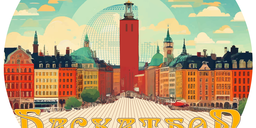
Comments 2
Comments are disabled on articles published more than a year ago. If you'd like to inform us of any issues, please reach out to us via the contact form here.
Toerless Eckert •
Thanks a lot for your thorough write up and passionate activism. In your proposal for "degrowth" of the Internet, i think you are overlooking various important aspects: 1. As privileged western technologist, we can not dictate less privileged people on this planet with little or no Internet connectivity to continue advancing to sustainable levels of Internet deployment and use. This alone will be a significant growth factor. 2. We do not really know what "sustainable" is for the Internet, except for a very coarse, overall planetary ideas of how to limit global warming. IMHO, we first would need to figure out if we can reach agreement as to what a "sustainable Internet" means. I am sure "degrowth" in part where exesses exist is part of it (as we see with proof of work / crypto-currencies), but it is but one part of a big puzzle. 3. Internet based workflows such a tele-collaboration, or digitization of public services and industries instead of physical travel, or paper based processes can increase planetary sustainability by reducing energy consumption, CO2 emissions or deforestation, just to name a few. Any growth of the Internet that is net positive for planetary sustainability is therefore good. 4. Being almost entirely energy based, Internet workflows are amongst the easiest to make sustainable by use of green energy. There are huge hydroelectric power plants in underserved parts of the planet whose energy could provide mobile Internet infrastructure for millions of rural population for education, e-banking, farming support, political participation and other core services, but instead that energy is put into aluminum electrolysis to produce more cheap aluminum cans. And in western countries, the very same aluminum plants get tax subsidized energy prices to compete. As are subsidized fuels for airplanes vs. non-subsidized fuels prices for trains in some countries (just as typical examples). IMHO, the most important aspect of activism should be to make our Internet industry carry the actual planetary costs of its non-renewable energy consumption and emissionsincluding the cost of protecting ourselves against the military conflicts these energies cost, and not allow to repay those costs via ill-suited carbon certificate trading, but only by investments into actual renewable energy production/consumption.
Vesna Manojlovic •
IETF draft has been published for the report from this workshop: "Report from the IAB Workshop on Environmental Impact of Internet Applications and Systems, 2022" https://datatracker.ietf.org/doc/draft-iab-ws-environmental-impacts-report/